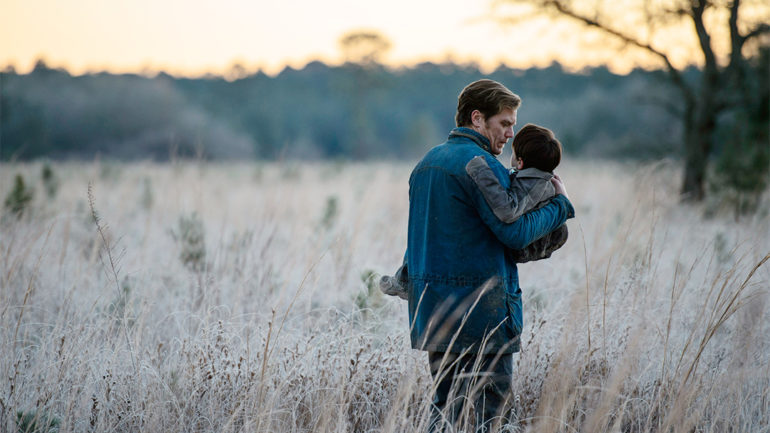Look at a trailer or poster for Midnight Special, and the name of one director will spring to mind. It’s unlikely to be that of its own director (and writer) Jeff Nichols, and that’s the way he wants it. When a new generation of directors raised on the movie brats get their hands on sufficient talent and budget, their original influences can dominate the landscape. In the case of Midnight Special, Nichols not only demonstrates a love and knowledge of the work of Steven Spielberg, but reminds us that his work is more than the PG-13-baiting list of favourites that immediately springs to mind. Spielberg’s legacy is determined largely by his capacity to entertain the masses, but this inclination tends to overlook his capacity for dark, adult thrillers. You don’t even have to look to Munich or Bridge of Spies for proof; the Indiana Jones series and Jurassic Park owe some of their reputations to the subversive dark streak that runs through the Bearded One’s CV. Midnight Special borrows its plot from some Spielbergs, and its tone from others, blending them into an effective reclamation of his oeuvre for all audiences.
We open in Sugarland Express territory, with Roy (Michael Shannon) and his friend Lucas (Joel Edgerton) hiding out in a motel, away from the law. With them is Alton (Jaeden Liberher), who Lucas and Roy have just kidnapped from the religious sect led by Calvin Meyer (Sam Shepherd). Like his namesake, Calvin is convinced the future is predetermined, specifically in the multilingual ramblings that periodically emerge from Alton, who has become an oracle to the cult. Alton may or may not be Roy’s son, but that’s as much certainty as we get in the early scenes. The boy is privy to some variety of paranormal abilities, but at first the film is less concerned with his powers than with Roy and Lucas’ efforts to keep him from the cult. As Roy, Lucas and Alton race to get further away, glimpses come and go of Alton’s abilities but, until the climax, Midnight Special plays out for the most part like a chase thriller in the early Spielberg mould (Think Duel or the aforementioned Sugarland Express). Roy and Lucas know of Alton’s abilities, as does Roy’s wife Sarah (Kirsten Dunst). On their trail is FBI investigator Paul Sevier (Adam Driver); much like Sevier, the audience learns of Alton’s abilities and influence second-hand (Ideas of secondhand witness run throughout; even nominal kidnappers Roy and Lucas watch reports of Alton’s abduction on the news). Nichols is too talented a writer and director to show his hand too early, and so builds anticipation by revealing the truth bit by bit. The interviews Sevier conducts with members of the cult hint at a possible armageddon, but even they can only speculate. The thrill comes from the unknown; the growing desire to find out Alton’s identity, be it alien, fallen angel or something else entirely, is Midnight Special’s lifeblood.
Roy helps Alton elude the authorities like Elliot helped E.T., but the narrative isn’t the only thing Midnight Special has in common with Spielberg’s film. The most identifiable trait it shares with his work is the care the characters have for one another. With the sect, the FBI and the military all bearing down on them, the familial bonds at the heart of the film are its most endearing and memorable aspect. Roy, Sarah and Lucas’ concern for Alton is uncynical, unquestioning, and certainly not naive. All are risking their lives for this little boy who may not even be a boy, but their connection to him is all that counts. There are hints that Roy and Sarah’s relationship is recovering from a Spielbergian absent-parent trauma, but it’s never over-elaborate or overplayed. It helps to have fine actors like Dunst and Shannon (The latter impressing in a relatively straight-and-narrow role) playing against Liberher, delivering a likeable turn shorn of any precociousness. Interestingly, Edgerton may be the best of the lot. Between his performance in his directorial debut The Gift and his unpolished everyman turn here, Edgerton is proving to be a subtle chameleon. This cast carry the film along, the gradual build echoing a similar approach to the final reveal in Close Encounters of the Third Kind. Midnight Special is pacy, though the final edit is a bit of a mixed bag. Individual moments of tension see Nichols wrangle tension out of proceedings by extending them by a precious few frames before a sudden cut. Yet, individual precision can’t overcome the fact that some supporting characters and plot details are left wanting. Audiences might be left wanting by the eventual reveal; even coming from the director of Take Shelter and Mud, two films that revelled in their final ambiguities, this one will prove divisive.
It’s tricky to argue that Midnight Special does much new with the Spielberg mythos. There are interesting age-reversals at work in some of the roles (Compare Driver’s fresh-faced authority figure with Shannon’s craggy protagonist), but the basic narrative points are a little too indebted to what came before. Still, there’s a simple unabashed magic at work here, recalling a time when ambition and talent worked over predictability. A familiar taste, perhaps, but it’s made from wholesome ingredients.

